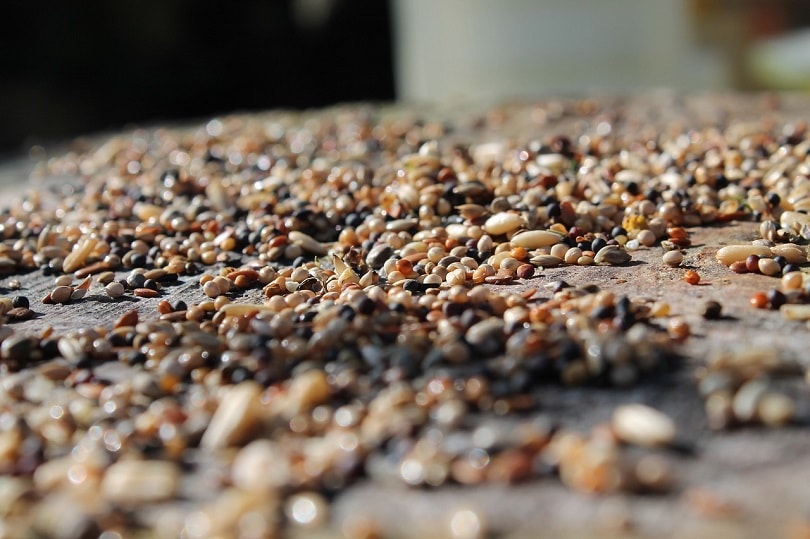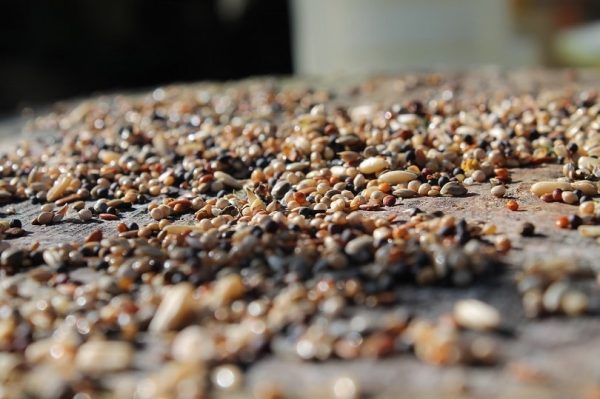Some dogs are such picky eaters that they won’t touch certain flavors of dog food. On the other hand, some dogs love to eat almost anything and everything, whether good or bad, edible or not. One thing that a food-loving dog may gravitate towards is your bird feeder, or at least under it. Birds love to splash in birdbaths and tend to make a big mess around their feeders too. However, if your dog enjoys licking up birdseed, it won’t remain on the ground for long.
Although eating a few fresh seeds usually isn’t harmful to dogs, it can have negative effects on their health, and you should try to implement ways to prevent them from being able to get to the fallen birdseed. Placing the feeder above a bush or in a section of your yard that your dog doesn’t have access to are a few simple ways. Keep reading to learn why birdseed isn’t recommended for dogs and what you should do to keep them away from your bird feeder.
Why Birdseed Isn’t Recommended for Dogs
Birdseed contains various types of seeds that are intended for consumption by birds, not dogs. Therefore, it can cause a few issues when eaten by dogs. Here are a few potential problems it can cause for your dog:
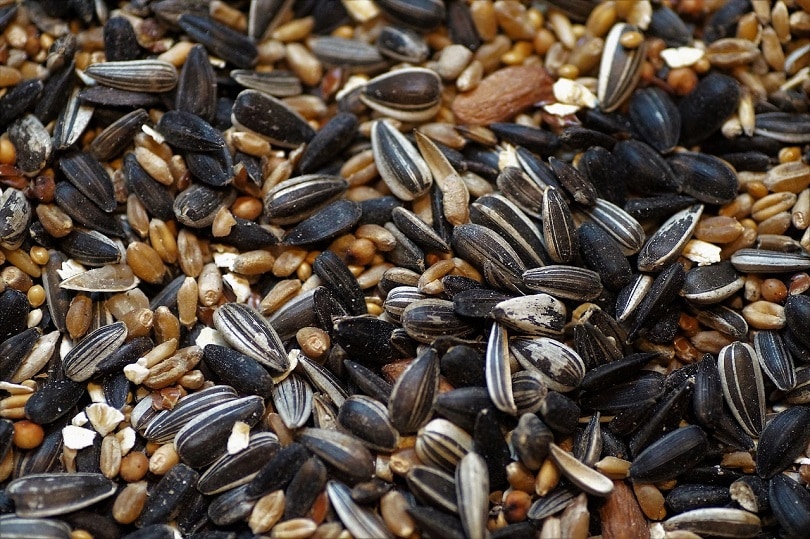
Gastrointestinal Upset
You don’t need to be alarmed if you’ve seen your dog eat a few fresh seeds off the ground, as long as it wasn’t a large quantity. If they jumped up, tipped over the feeder, and half the seeds fell out, you may have a more concerning situation on your hands. Thankfully, the latter scenario is less common than the first.
Birdseed is usually made up of a mixture of sunflower seeds and safflower seeds. These seeds are high in protein and healthy fats and aren’t toxic to dogs. However, they can cause gastrointestinal upset, which could leave your dog with diarrhea, vomiting, and stomach cramps.
Some types of birdseed may contain other ingredients, too, such as raisins, which are not safe for dogs to eat.
Aflatoxin Poisoning
A serious risk to dogs that eat birdseed is aflatoxin poisoning 1. Old birdseed that has been lying on the ground through rain and dew can become damp and moldy. If your dog eats moldy seeds over and over, aflatoxin levels can build up in your dog, and damage can occur to their liver. They may develop blood clotting issues, and they can eventually die.
Symptoms of aflatoxin poisoning in your dog will include lethargy, unusual bleeding, jaundice, vomiting, diarrhea, and loss of appetite.
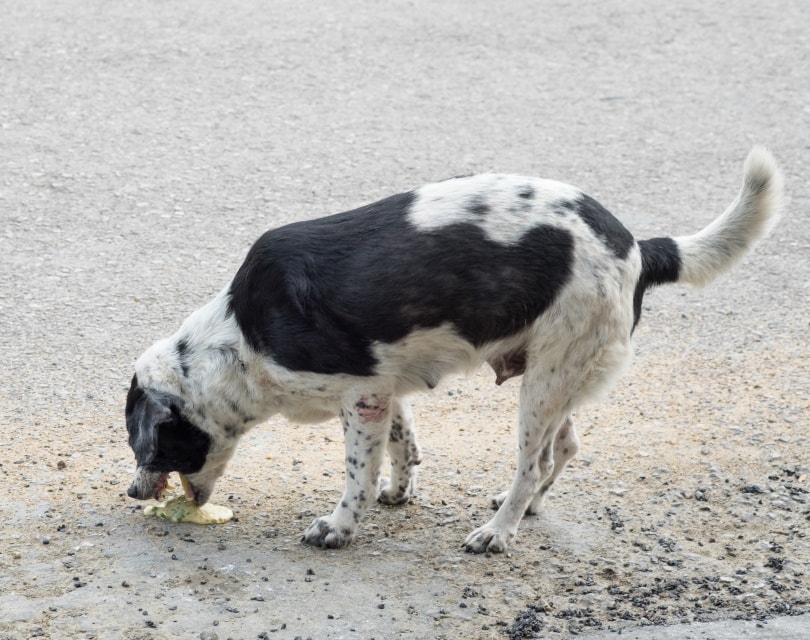
It Can Expose Your Dog to Salmonella
Birdseed isn’t the only thing you’ll find under the bird feeder that has been dropped by the birds, as they’ll also have left their feces. Unfortunately, the feces will be in the same area as the bird seed, and as your dog eats up the seed, they’ll be eating up the feces too.
The risk with eating bird feces is that it contains bacteria and parasites, such as salmonella. Salmonella infection 2 can cause a variety of problems in dogs, such as fever, diarrhea, vomiting, weight loss, skin disease, swollen lymph nodes, and much more.
What Can I Do to Prevent My Dog from Eating Birdseed?
There are many health issues that can arise from your dog eating bird seed, so it’s important to prevent them from lapping up the bird’s leftovers altogether.
As a dog lover, there is a high chance that you have a soft spot for all wildlife, and watching different species of birdlife flock around your bird feeder every day could be one of your many joys in life. However, it is important to keep your dog safe, and thankfully, there are a few ways to do this.
1. Place a Pot Plant Below the Feeder
If you don’t want to move your bird feeder from its current spot, you can move a pot plant below the feeder instead. As the birds spill out their seeds, they’ll fall into the pot and not on the ground, which could stop your dog from eating them.
Otherwise, you could consider moving your bird feeder above a bush so that the seeds fall into the bush, making it hard for your dog to reach them.
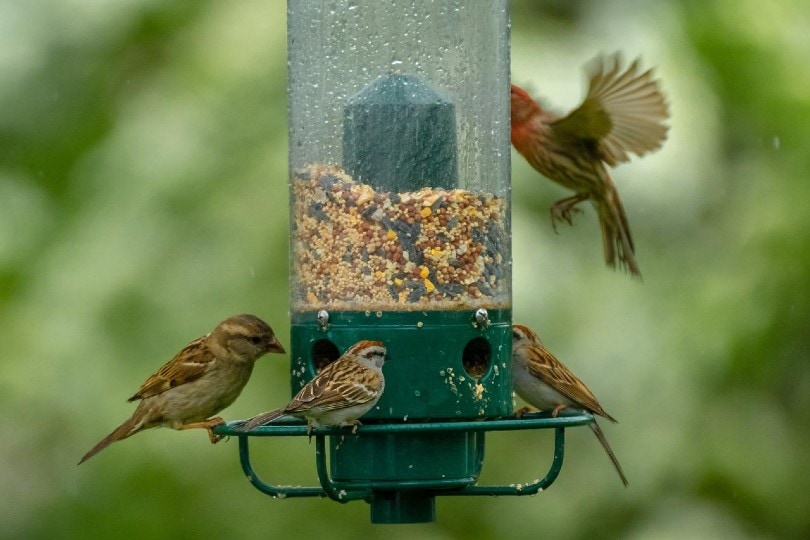
2. Keep It Clean
If you’re not worried about your dog eating the occasional seed or two but are worried about moldy seeds that could cause health issues for your dog, you may need to become diligent about keeping the feeder and area below it clean. Regularly clean and sanitize your feeder and stock it up with fresh seeds. You’ll also need to frequently sweep up the seeds that fall to the ground before they have the chance to become damp and moldy.
3. Deny Access to It
If you have a section of your yard that your dog cannot access, such as the pool area, this would be a great spot to keep your bird feeder. If your dog has access to your entire yard, you could consider placing decorative fencing around the bird feeder to deny them access to the seeds.
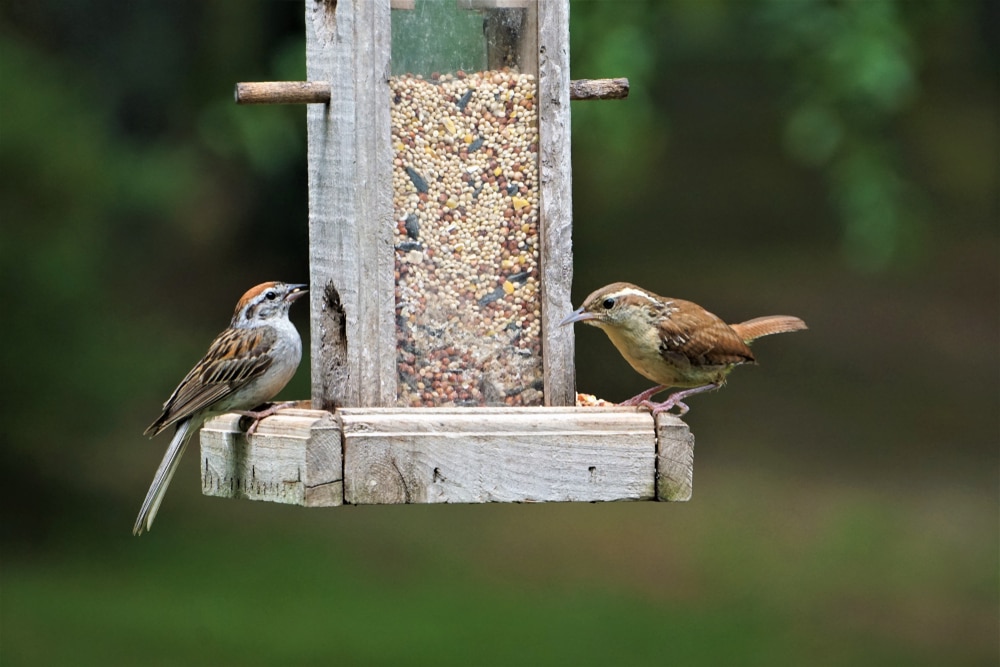
4. Don’t Have a Bird Feeder
The last option is to do away with the bird feeder entirely. Of course, this may not be an option for some people, but for others, it might be your only solution. If you’re lucky, you’ll still be able to sit outside and enjoy the birdlife, even without feeding them.
Conclusion
You don’t need to worry if your dog has eaten a few bird seeds, as they’ll probably only have a bit of diarrhea or vomiting—or they could be completely fine. However, there is cause for concern if they eat a large quantity of birdseed or moldy seed. Aflatoxin poisoning and salmonella infection are other risk factors for eating old seeds off the ground.
Thankfully, you can prevent your dog from this behavior by placing a barrier around the feeder or a pot plant below it. You could also consider removing the feeder entirely, or you may need to start to sweep the seeds up frequently.
Featured Image Credit: ASCII85, Pixabay

